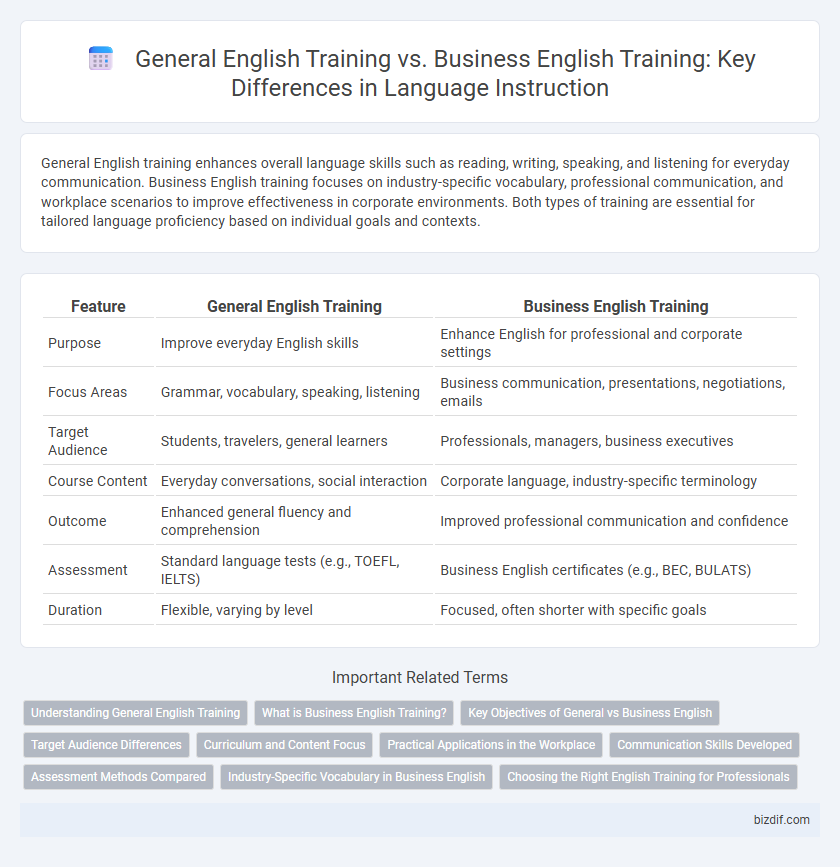General English training enhances overall language skills such as reading, writing, speaking, and listening for everyday communication. Business English training focuses on industry-specific vocabulary, professional communication, and workplace scenarios to improve effectiveness in corporate environments. Both types of training are essential for tailored language proficiency based on individual goals and contexts.
Table of Comparison
| Feature | General English Training | Business English Training |
|---|---|---|
| Purpose | Improve everyday English skills | Enhance English for professional and corporate settings |
| Focus Areas | Grammar, vocabulary, speaking, listening | Business communication, presentations, negotiations, emails |
| Target Audience | Students, travelers, general learners | Professionals, managers, business executives |
| Course Content | Everyday conversations, social interaction | Corporate language, industry-specific terminology |
| Outcome | Enhanced general fluency and comprehension | Improved professional communication and confidence |
| Assessment | Standard language tests (e.g., TOEFL, IELTS) | Business English certificates (e.g., BEC, BULATS) |
| Duration | Flexible, varying by level | Focused, often shorter with specific goals |
Understanding General English Training
General English Training focuses on building foundational language skills including grammar, vocabulary, listening, speaking, reading, and writing for everyday communication. This training enhances fluency and comprehension in a wide range of social and professional contexts, improving overall language confidence. It is ideal for learners aiming to use English broadly rather than specialized business environments.
What is Business English Training?
Business English Training focuses on developing language skills tailored for professional environments, including vocabulary related to finance, marketing, negotiations, and presentations. It emphasizes effective communication in meetings, emails, and networking within global business contexts. This specialized training enhances proficiency in formal writing, industry-specific terminology, and intercultural communication essential for career advancement.
Key Objectives of General vs Business English
General English training emphasizes broad language skills including grammar, vocabulary, reading, writing, listening, and speaking for everyday communication. Business English training targets industry-specific terminology, formal communication styles, presentations, negotiations, and email correspondence relevant to professional environments. Both training types aim to boost language proficiency but differ in application contexts--general social interaction versus workplace effectiveness.
Target Audience Differences
General English Training caters to learners seeking improvement in everyday communication skills, including students, travelers, and casual speakers, emphasizing grammar, vocabulary, and conversational fluency. Business English Training targets professionals and corporate employees aiming to enhance workplace communication, focusing on industry-specific terminology, formal writing, presentations, and negotiation skills. Understanding the distinct needs of these target audiences ensures tailored curriculum development for effective language acquisition.
Curriculum and Content Focus
General English training emphasizes foundational language skills including grammar, vocabulary, reading, writing, listening, and speaking, suitable for everyday communication. Business English training focuses on industry-specific terminology, professional correspondence, presentations, negotiations, and workplace communication strategies. Curriculum for Business English often incorporates case studies, role-plays, and real-world business scenarios tailored to enhance professional language proficiency.
Practical Applications in the Workplace
General English training enhances overall communication skills such as listening, speaking, reading, and writing, promoting fluency and comprehension for diverse social and professional settings. Business English training targets industry-specific vocabulary, email etiquette, negotiation tactics, and presentation skills to improve effectiveness in corporate environments. Practical workplace applications of Business English include client interactions, report writing, meetings, and cross-cultural communication, directly impacting professional success.
Communication Skills Developed
General English Training enhances overall communication skills, including reading, writing, listening, and speaking, suitable for everyday interactions and social settings. Business English Training specifically develops professional communication skills such as negotiation, email writing, presentation techniques, and workplace vocabulary tailored to corporate environments. Both training types aim to boost confidence and fluency but differ in context and specialized terminology used.
Assessment Methods Compared
General English Training and Business English Training utilize distinct assessment methods tailored to their objectives. General English assessments emphasize grammar, vocabulary, reading comprehension, and speaking fluency through standardized tests and interactive evaluations. Business English assessments prioritize real-world communication skills, including presentation delivery, report writing, email etiquette, and negotiation techniques, often evaluated through role-plays, case studies, and performance-based tasks.
Industry-Specific Vocabulary in Business English
Business English Training emphasizes industry-specific vocabulary crucial for effective communication in sectors such as finance, healthcare, and technology, enhancing professional interactions. Unlike General English Training, which covers broad language skills and everyday vocabulary, Business English targets terminology related to meetings, negotiations, and presentations tailored to specific industries. Mastery of specialized business lexicon boosts clarity, professionalism, and confidence in workplace communication.
Choosing the Right English Training for Professionals
Choosing the right English training for professionals hinges on career goals and communication needs, with General English Training enhancing overall language skills including grammar, vocabulary, and everyday conversation. Business English Training targets industry-specific terminology, formal correspondence, presentations, and negotiation skills essential in corporate environments. Tailoring the program to fit professional contexts improves workplace communication effectiveness and boosts confidence in global business interactions.
General English Training vs Business English Training Infographic

 bizdif.com
bizdif.com